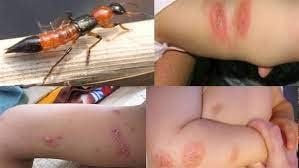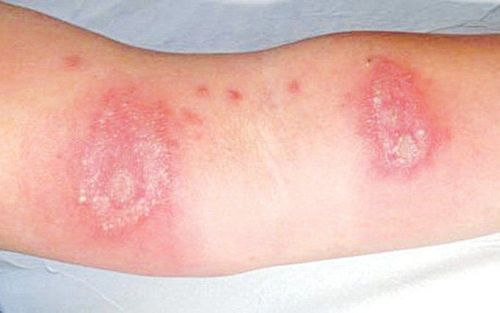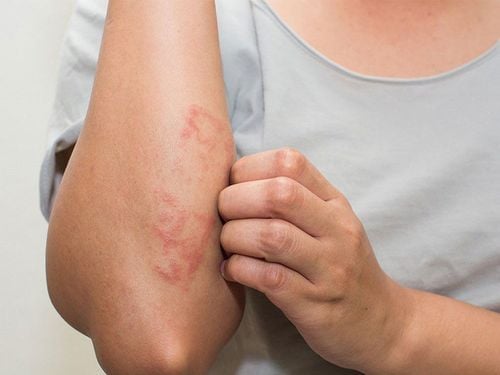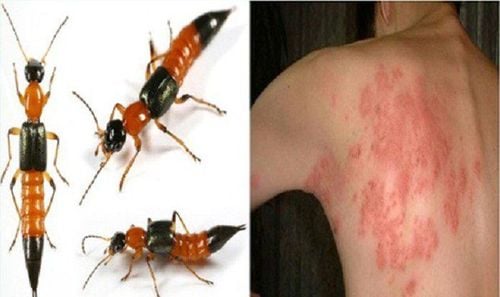This is an automatically translated article.
The three-compartment ant is very dangerous, because inside its body it contains the toxin Pederin. Therefore, whether contact with a person bitten by an ant is contagious is a question many people are interested in.
1. What is a three-chambered ant?
Winged trident ant, scientific name is Paederus fuscipes Curtis, belongs to family Staphilinidae (penguins), order Coleoptera (wings), class Insecta (insects), phylum. The three-cavity ant is also known as the emperor ant, the needle ant, the cross ant, the rice ant,...
Called the three-compartment ant because of the characteristics on the body of this animal. The three-chambered ant has a slender body that looks like a grain of rice. Body length about 0.7-1cm, width about 2-5mm. The three-cavity ant has 3 pairs of legs; tapered tail and transparent wings folded underneath the beetle. Therefore, this ant flies and runs very fast. On the abdomen there are many segments and divided into three compartments: Black cavity, red cavity. In particular, the head and lower abdomen are black, and the upper chest and abdomen are red. Because it is divided into three different color chambers, it is called the three-chambered ant.
Tripod ants like to live in hot and humid places, so they are common in areas with humid climates. They often live in fields, lawns, landfills, construction sites, ... wet places. Three-compartment ants appear more in the rainy season - when the humidity is high, the weather is warm - favorable for them to develop. When it rains, the ponds and fields are completely flooded, the three-chambered ants will find a dry place to hide, especially inside the house.
A very special feature of the three-chambered ants is that they are very fond of electric light, especially the light from fluorescent lamps. At that time, they will follow the light into the house and increase the risk of being bitten by ants.
The food of the three-cavity ants is also very diverse, mainly small insects. They often eat aphids, aphids, soot, small worms,...
Three-cavity ants are very poisonous. This is because the inside of the ant's body contains three compartments containing the toxin Pederin. Pederin is a very strong poison, 12-15 times stronger than the venom of a cobra. However, it is not fatal because of the small amount of poison and only skin contact.

Bị kiến ba khoang đốt rất nguy hiểm
2. What happens when bitten by ants?
When being bitten by ants, poison Pederin enters the body. Pederin can cause blistering, skin burns, inflammation in many degrees from mild to severe. Dermatitis caused by 3-compartment ants usually occurs in open areas such as the face, neck, chest, shoulders, nape, and hands.
On the damaged skin, red, streaked areas appear, with a slightly rough background. Besides, there are small blisters or pus in the middle. Some lesions are slightly concave yellow-brown, round or oval. Skin blistering, blistering may appear 12-36 hours from the time of sting. If the dermatitis is not treated, it will progress to an ulcer. Then these lesions will have the shape of a long straight line, or a Y shape... If treated late, the lesions can turn into red scars and last for many months to heal. If the toxin gets into the eye, it can lead to conjunctivitis and swelling of the soft tissue around the eye. In more severe cases, temporary blindness may occur.
3. What should I do when I have 3 burning chamber ants?
Immediately after being bitten by 3-cavity ants, wash the bitten area with alcohol 70 degrees or mild soap to relieve skin discomfort. Next is to see a doctor for timely examination and treatment, to avoid unwanted complications. Do not arbitrarily buy medicine to apply or use folk remedies such as applying tobacco leaves when bitten by three-cavity ants. This can cause the lesion to spread further and become infected.
After being bitten by ants, the damaged skin will feel uncomfortable and itchy. At this time, the patient does not scratch or rub the skin. If the itching is too much, you can apply a cold compress to relieve the symptoms.
A particularly important note when being bitten or attached by ants is not to hit them by any means. If you see them crawling on your skin, gently blow it away or use a piece of paper to let the ants crawl in and throw it away.
Wash the exposed skin after hitting or rubbing the three-chambered ant with your hand. This helps to remove their toxins and limit the effects it causes.

Ngay sau bị kiến 3 khoang đốt, rửa sạch vùng da bị cắn bằng cồn 70 độ
4. Is it contagious if bitten by three-cavity ants?
The three-cavity ant bite leaves a lot of consequences and complications. So, is it contagious when bitten by an ant? When being bitten by ants, Pederin toxin enters the body. When a foreign antigen invades, according to the immune mechanism, the body will produce antibodies to eliminate this antigen. The reaction between antigens and antibodies will cause inflammation, acne, blistering, itching, etc. Therefore, being bitten by ants will not spread from one person to another.
However, if the patient scratches the damaged skin due to the stinging of ants, the damage will spread more widely, even spread throughout the body. Therefore, be careful when being burned by ants.
Thus, being bitten by 3-compartment ants is not capable of spreading from person to person. However, it can cause major damage to the skin. Therefore, it is necessary to be careful in life and in work to minimize the bite of three-cavity ants.
Please dial HOTLINE for more information or register for an appointment HERE. Download MyVinmec app to make appointments faster and to manage your bookings easily.













